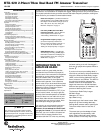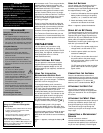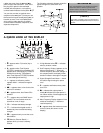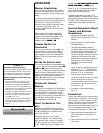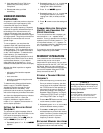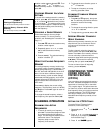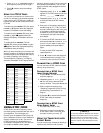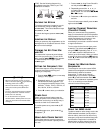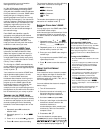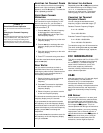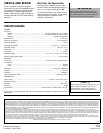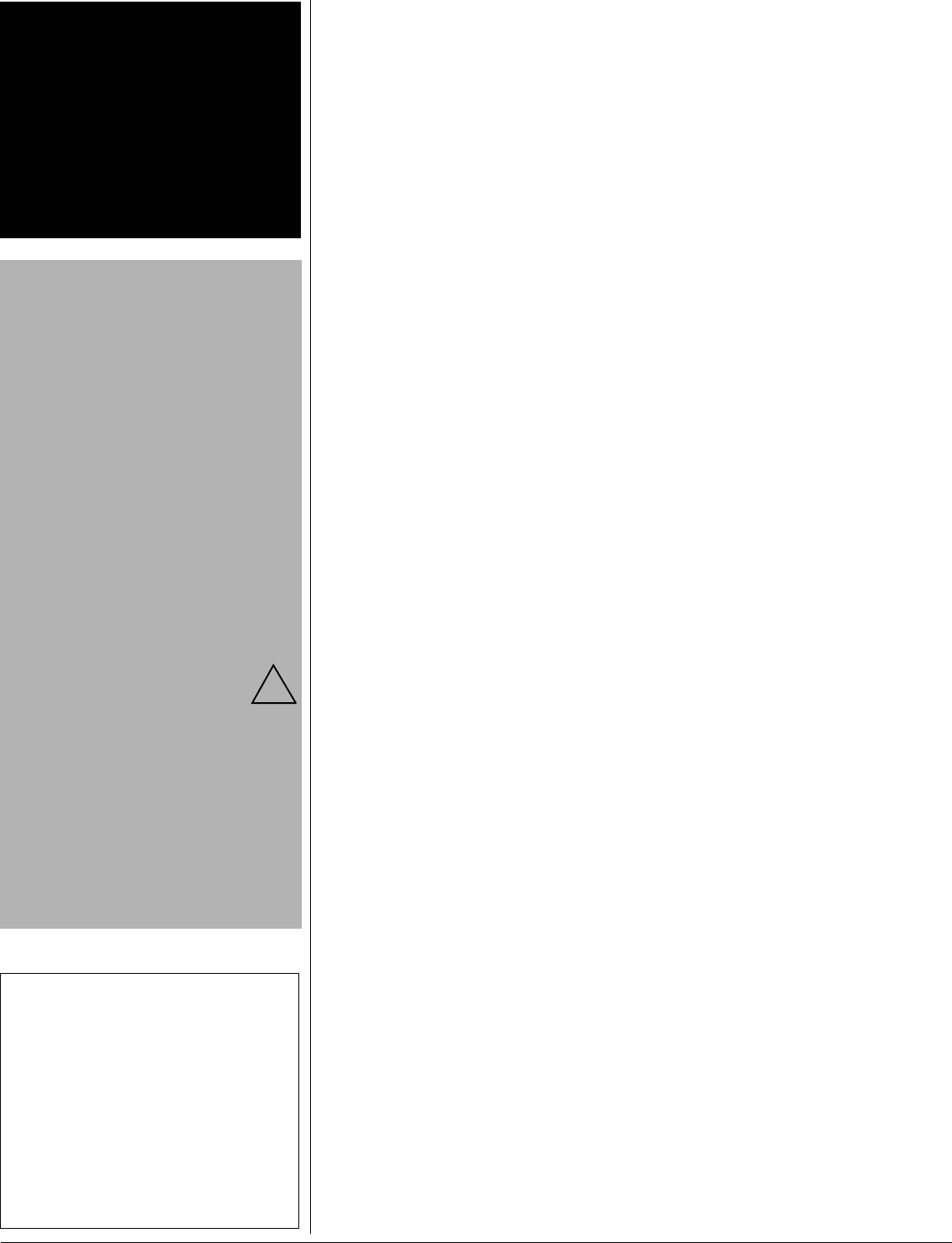
2
about amateur radio. There are good books,
cassette tapes, computer programs, and
many other study aids available. Your local
RadioShack store sells FCC License
Preparation study guides for amateur radio
operator licenses. While you are no longer
required to learn Morse code for a Technician
Class license, we encourage you to learn it
so you can advance to higher levels of
operating privileges.
There is a small fee required for taking the
Technician exam. All license level tests are
administered by a three-member Volunteer
Examiner Team. Contact the ARRL for a
schedule of exam opportunities in your area.
The Technician Class license lets you use
the transceiver to communicate directly with
other operators, and use repeaters for distant
communication.
24'2#4#6+10
You can power your transceiver using
internal batteries, AC power or vehicle
battery power (using a RadioShack 270-031
power cable, not supplied, available at your
local RadioShack store or online at
www.RadioShack.com).
75+0)"+06'40#."$#66'4+'5
You can power the transceiver using the
supplied lithium-ion rechargeable battery
pack and its supplied adapter or four AA
alkaline batteries (not supplied), available at
RadioShack.
75+0)"6*'".+6*+7//+10"
4'%*#4)'#$.'"$#66'4;"2#%-
Before you use the lithium-ion rechargeable
battery pack, you must charge it. The battery
pack has a built-in charging circuit.
To charge the battery pack, connect the
supplied AC adapter to the battery pack’s DC
12V jack. Then plug the adapter’s other end
into a standard AC outlet. If you have
installed the battery pack to the transceiver,
turn off the transceiver. The indicator on the
battery pack lights red while charging and
lights green when the charging finishes. A
fully discharged battery pack can take as
long as 10 hours to fully recharge.
R
RR
R
".
±
±±
±
When the battery pack is fully charged,
unplug the adapter from the AC outlet, then
disconnect the adapter from the battery pack.
Install the battery pack by inserting its upper
edge first then press it down. Then lift and
press down the lock tab to secure the battery
pack.
When
•
appears, recharge the battery.
.#
±
±±
±
75+0)"##"$#66'4+'5
You can power your transceiver using four
alkaline AA batteries (not supplied and
available at your local RadioShack store) with
the supplied battery holder.
R
RR
R
".
1. Insert four AA batteries into the supplied
battery holder according to the polarity
symbols (+ or –) marked on the holder.
2. Attach the battery holder onto the
transceiver and fasten the lock tab.
When
•
appears, replace the batteries.
75+0)"#%"14"&%"219'4
To power the transceiver from an AC outlet or
your vehicle’s battery power, you need a 12V
regulated DC power supply that delivers at
least 2A (for AC) and a RadioShack 270-031
power cable (not supplied, available at
RadioShack). Another type of cable might not
work with your transceiver.
.
1.
For AC power,
if the power supply has a
voltage switch, set the switch to 12V.
2. Insert the power cable’s cord into the
transceiver’s
EXT
jack.
3.
For AC power,
connect the other end of
the power cable to the power supply,
then plug the power supply’s power cord
into the power source.
For DC power,
plug the other end of the
power cable into the vehicle’s cigarette
lighter socket.
%100'%6+0)"6*'"#06'00#
Place the threaded base socket of the
supplied antenna over the antenna connector
on top of the transceiver and turn the antenna
clockwise to tighten it. To remove the
antenna, turn it counterclockwise.
.
±
±±
±
#66#%*+0)"6*'"$'.6"%.+2
Use a Phillips screwdriver and the two
supplied screws to attach the supplied belt
clip to your transceiver. Do not overtighten
the screws.
#66#%*+0)"6*'"94+56"564#2
To attach the supplied wrist strap to the top of
the belt clip, thread the strap's small loop
through the opening in the top of the clip.
Then insert the longer loop through the
smaller loop and pull on the strap until the
loop is tight.
%100'%6+0)"#"/+%412*10'1
52'#-'4
You can connect an external
communications headset (consisting of a
microphone and speaker) to the transceiver
so you can use it privately. Lift the hinged,
ý
R
"9#40+0)"
R
"
Using the Lithium-Ion Rechargeable
Battery Pack
When you remove the battery pack from the
transceiver, be sure to turn off the transceiver
before you remove the battery pack.
Using AA Batteries
• When you remove the battery holder to replace
the batteries, be sure to turn off the transceiver
before you remove the battery holder.
• Dispose of old batteries promptly and properly.
Do not burn or bury them.
.
"%#76+10"
.
Using the Lithium-Ion Rechargeable
Battery Pack
• The supplied adapter is designed only to
recharge the battery pack. Do not attempt to
transmit using the adapter to power the radio.
• Use a coin or other solid object to unlatch the
lock tab when you remove the battery pack.
Using AA Batteries
• Use only fresh batteries of the required size
and recommend type.
• Always remove old or weak batteries.
Batteries can leak chemicals that destroy
electronic circuits.
• Do not mix old and new batteries, different
types of batteries (standard or alkaline).
• If you do not plan to use the transceiver with
batteries for two weeks or more, remove the
batteries.
Using AC or DC Power
• You must use a Class 2 power
source that supplies 12V DC and
delivers at least 2A. Its center tip
must be set to positive and its plug
must fit the transceiver’s EXT jack. Using a
power supply that does not meet these
specifications could damage the transceiver
or the power supply.
• Always connect the power cable to the
transceiver before you connect it to the power
source. When you finish, disconnect the cable
from the power source before you disconnect
it from the transceiver.
Connecting the Antenna
Do not over-tighten the antenna.
!
±
±±
±
"016'"
±
±±
±
"
Using the Lithium-Ion Rechargeable
Battery Pack
• The battery pack’s indicator does not change
to green if you use the transceiver while
charging the battery pack.
• Using a pencil eraser, clean the charging
contacts on lithium-ion battery pack.
Connecting the Antenna
You can connect an external antenna to the
transceiver using an SMA-to-BNC adapter. The
adapter and suitable antennas are available at
your local RadioShack store.



